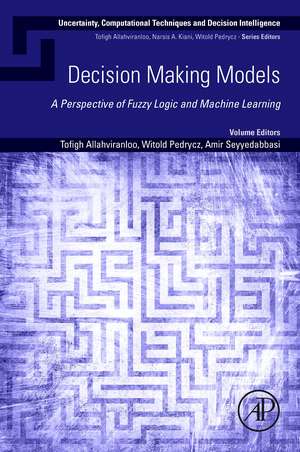Decision-Making Models: A Perspective of Fuzzy Logic and Machine Learning: Uncertainty, Computational Techniques, and Decision Intelligence
Editat de Tofigh Allahviranloo, Witold Pedrycz, Amir Seyyedabbasien Limba Engleză Paperback – 25 iul 2024
Other areas of note include optimization problems and artificial intelligence practices, as well as how to analyze IoT solutions with applications and develop decision-making mechanisms realized under uncertainty.
- Introduces mathematics of intelligent systems which provides the usage of mathematical rigor such as precise definitions, theorems, results, and proofs
- Provides extended and new comprehensive methods which can be used efficiently in a fuzzy environment as well as optimization problems and related fields
- Covers applications and elaborates on the usage of the developed methodology in various fields of industry such as software technologies, biomedicine, image processing, and communications
Preț: 637.90 lei
Preț vechi: 940.78 lei
-32% Nou
Puncte Express: 957
Preț estimativ în valută:
122.06€ • 127.44$ • 101.02£
122.06€ • 127.44$ • 101.02£
Carte tipărită la comandă
Livrare economică 28 martie-11 aprilie
Livrare express 28 februarie-06 martie pentru 171.77 lei
Preluare comenzi: 021 569.72.76
Specificații
ISBN-13: 9780443161476
ISBN-10: 044316147X
Pagini: 678
Dimensiuni: 191 x 235 x 35 mm
Greutate: 1.15 kg
Editura: ELSEVIER SCIENCE
Seria Uncertainty, Computational Techniques, and Decision Intelligence
ISBN-10: 044316147X
Pagini: 678
Dimensiuni: 191 x 235 x 35 mm
Greutate: 1.15 kg
Editura: ELSEVIER SCIENCE
Seria Uncertainty, Computational Techniques, and Decision Intelligence
Cuprins
Section 1: Decision Making: New Developments
1. Neural networks
2. Artificial intelligent algorithms, motivation and terminology
3. Decision processes
4. Learning theory
Section 2: Metaheuristic Algorithms
5. Nature-inspired algorithms
6. Physic-based algorithms
7. evolution-based algorithms
8. swarm-based algorithms
9. Multi-objective algorithms
10. Unconstrained / constrained nonlinear optimization
11. Evolutionary Computing
Section 3: Optimization Problems
12. Mathematical Programming
13. Discrete and Combinatorial Optimization
14. Optimization and Data Analysis
15. Applied optimization problems
16. Engineering problems
Section 4: Machine Learning
17. Deep Learning
18. (Artificial) Neural Networks
19. Reinforcement Learning Algorithms
20. Classification and clustering
Section 5: Soft Computation
21. Uncertainty theory
22. Fuzzy sets
23. Computation with words
24. Soft modelling
25. Uncertain optimization models
26. Chaos theory and chaotic systems
Section 6: Data Analysis
27. Data mining and knowledge discovery
28. Categories of techniques of data analysis
29. Numerical analysis
30. Risk analysis
Section 7: Fuzzy Decision System
31. Fuzzy Control
32. Approximate Reasoning
33. Effectiveness in Fuzzy Logics
34. Neuro-fuzzy Systems
35. Fuzzy rule-based systems
1. Neural networks
2. Artificial intelligent algorithms, motivation and terminology
3. Decision processes
4. Learning theory
Section 2: Metaheuristic Algorithms
5. Nature-inspired algorithms
6. Physic-based algorithms
7. evolution-based algorithms
8. swarm-based algorithms
9. Multi-objective algorithms
10. Unconstrained / constrained nonlinear optimization
11. Evolutionary Computing
Section 3: Optimization Problems
12. Mathematical Programming
13. Discrete and Combinatorial Optimization
14. Optimization and Data Analysis
15. Applied optimization problems
16. Engineering problems
Section 4: Machine Learning
17. Deep Learning
18. (Artificial) Neural Networks
19. Reinforcement Learning Algorithms
20. Classification and clustering
Section 5: Soft Computation
21. Uncertainty theory
22. Fuzzy sets
23. Computation with words
24. Soft modelling
25. Uncertain optimization models
26. Chaos theory and chaotic systems
Section 6: Data Analysis
27. Data mining and knowledge discovery
28. Categories of techniques of data analysis
29. Numerical analysis
30. Risk analysis
Section 7: Fuzzy Decision System
31. Fuzzy Control
32. Approximate Reasoning
33. Effectiveness in Fuzzy Logics
34. Neuro-fuzzy Systems
35. Fuzzy rule-based systems





